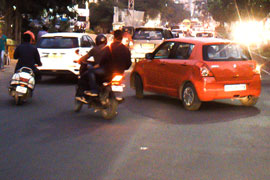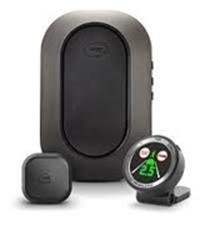Advancing the state-of-AI research in the area of road safety to reduce accidents & fatalities in the country.
INAI’s goal in this domain is to advance state-of-AI research in
the area of road safety that aligns with VISION ZERO goal of the
government to reduce road accidents & fatalities in the
country. Towards this goal, INAI put together the world’s first
driving dataset (IDD) of Indian driving conditions.
While
several datasets for autonomous navigation have become available
in recent years, they have tended to focus on structured driving
environments. This usually corresponds to well-delineated
infrastructure such as lanes, a small number of well-defined
categories for traffic participants, low variation in object or
background appearance and strong adherence to traffic rules.
The driving conditions in India are quite diverse and the
traffic behaviour is highly unstructured compared with rest of
the world. These driving conditions pose unique challenges that
are yet unsolved, for research in artificial intelligence (AI)
and machine learning (ML) systems, and hence offer an immense
opportunity for possible technical innovations in AI/ML systems
for better road safety.

IDD is a novel dataset for road scene understanding in unstructured environments. It consists of 10,000 images, finely annotated with 34 classes collected from 182 drive sequences on Indian roads.The dataset consists of images obtained from a front facing camera attached to a car driven in Hyderabad and Bengaluru.

Project iRASTE Nagpur: This project uses AI & ADAS as a force multiplier to transform Road Safety and reduce Road accidents. Focus is on Urban Environment in Nagpur.

Project iRASTE Telangana: This project uses AI & ADAS as a force multiplier to transform Road Safety and reduce Road accidents. Focus is on Highway network Telangana.

Bodhyaan Car Platform: Bodhyaan is the car data capture platform at IIIT-Hyderabad and will have multiple sensors – cameras, LIDARs, night-vision cameras, RADARs, including the required computational power to capture and process real-time data on the car. Bodhyaan 1.0 is presently equipped with 6 cameras for a full surround view, a LIDAR sensor and high compute for data capture and processing. Researchers, academics, and start-ups in India, can use this platform to test algorithms or methods in vehicle navigation, data collection, or anything related to Indian roads and research.

Project TS-20 was conducted in the city of Hyderabad, Telangana, using Collision Avoidance Systems (CAS) installed in a fleet of 20 vehicles. The objective of this project was to study the impact of collision alert systems on driver behaviour. The vehicles in this project operated on the roads of Hyderabad and were observed over a period of six months. It was observed that presence of a CAS system changed the behaviour of 54% drivers on average to adopt safer driving behaviour, and among those drivers who changed behaviour, the average improvement in driving behaviour was about 34%. From the analysis and results on various aspects in the study, it was concluded that the use of a collision avoidance system leads to a change in behaviour – improved safer driving among drivers.
AutoNUE 2019 IDD Challenge
While several datasets for autonomous navigation have become
available in recent years, they have tended to focus on
structured driving environments. IDD is a novel dataset for road
scene understanding in unstructured environments. It consists of
20,000 images, finely annotated with 34 classes collected over
200 drive sequences on Indian roads. The label set is expanded
in comparison to popular benchmarks such as Cityscapes, to
account for new classes.
The challenge features:
•
Datasets for segmentation, localization
• More than 20,000
annotated images hand picked from unstructured environments and
occurrence of rare events
• More associated data including
nearby frames, LIDAR data, GPS which can be used for specific
challenges
• Challenges for resource constrained models
with specific runtime budgets.
NCVPRIPG 2019 IDD Challenge
Following up on the AutoNUE 2019 IDD challenge, we launched a
new challenge at NCVPRIPG 2019 IDD for students in Indian
universities and colleges with the following enhancement.
• Semantic segmentation on IDD Lite Dataset
IDD-Lite,
less than 50MB in size, is small and compact to fit on any
personal computer and so will not need huge-compute
infrastructure. It contains 7 classes (compared to 30 in IDD).
Proceedings of the 31st British Machine Vision Conference (BMVC), 2020
Spatial Feedback Learning to Improve Semantic Segmentation in Hot Weather
Shyam Nandan Rai, Vineeth N Balasubramanian, Anbumani Subramanian , C.V. Jawahar
Proceedings of the 31st British Machine Vision Conference (BMVC), 2020
Munich to Dubai: How far is it for Semantic Segmentation?
Shyam Nandan Rai, Vineeth N Balasubramanian, Anbumani Subramanian and C. V. Jawahar
International Conference on Robotics and Automation (ICRA), 2020
RoadText-1K: Text Detection & Recognition Dataset for Driving Videos
Sangeeth Reddy, Minesh Mathew, Lluis Gomez, Marçal Rusinol, Dimosthenis Karatzas and C. V. Jawahar
National Conference on Computer Vision, Pattern Recognition, Image Processing and Graphics (NCVPRIPG), 2019
Semantic Segmentation Datasets for Resource Constrained Training
Ashutosh Mishra, Sudhir Kumar, Tarun Kalluri, Girish Varma, Anbumani Subramaian, Manmohan Chandraker and C. V. Jawahar
National Conference on Computer Vision, Pattern Recognition, Image Processing and Graphics (NCVPRIPG), 2019
Dear Commissioner, please fix these: A scalable system for inspecting road infrastructure
Raghava Modhugu, Ranjith Reddy and C. V. Jawahar
International Conference on Computer Vision (ICCV), 2019
Universal Semi-Supervised Semantic Segmentation
Tarun Kalluri, Girish Varma, Manmohan Chandraker and C. V. Jawahar
IEEE Winter Conference on Applications of Computer Vision (WACV), 2019
IDD: A Dataset for Exploring Problems of Autonomous Navigation in Unconstrained Environments
Girish Varma, Anbumani Subramanian, Anoop Namboodiri, Manmohan Chandraker and C V Jawahar